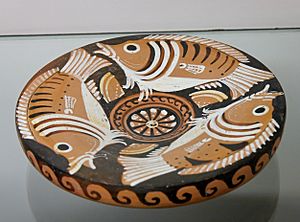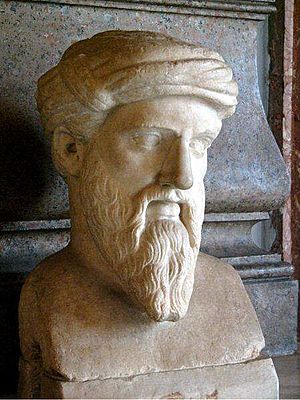Nutrition in classical antiquity facts for kids

Classical antiquity was a long period in history. It lasted from about 800 BC to 500 AD. This time ended when the Middle Ages began. Important civilizations like ancient Greece and ancient Rome thrived then. They were mostly around the Mediterranean Sea.
People in these times ate simple, natural foods. These foods were either grown nearby or brought from other places. Doctors and thinkers back then studied how food affected the body. They believed that eating well was key to staying healthy. They also thought food could help people get better when they were sick.
Contents
Food in Ancient Times
People in ancient times had many food choices. They ate dairy products like milk and cheese. Fruits included figs, pears, apples, and pomegranates. Vegetables were greens and bulbs. Grains and legumes were also very common. These included wheat, barley, millet, beans, and chickpeas. They also ate meat like beef, mutton, and fowl. Seafood like mussels and oysters were also part of their diet.
Most food was eaten fresh. But people also processed food to keep it longer. This helped them store food for winter or send it to other cities. Cereals, olives, wine, and vegetables could all be stored. Grains were often made into bread, flat-cakes, or porridge. Legumes were dried and eaten with bread.
Grains were very important for nutrition. They gave people protein, B vitamins, E vitamins, calcium, and iron. Fruits and vegetables provided vitamins A, C, and D. They also gave half the fiber needed for good health.
When Food Was Scarce
Cities often relied on farmers and other cities for food. This was because they didn't have enough land to grow all their own food. Many things could affect the food supply. These included the weather, where a city was located, and how food was moved.
Bad weather could greatly reduce how much food was harvested. The Mediterranean region often had changing temperatures and rainfall. These changes also affected the quality of the soil. If a growing season was poor, cities had to trade for food. This could be hard due to political problems or transport issues.
When food was very scarce, people sometimes ate unusual things. They might eat twigs, plant roots, or tree bark to survive. Food shortages happened often. But they usually didn't last long enough to cause widespread famine.
Important Thinkers About Food
Pythagoras: The Vegetarian Pioneer
Pythagoras (570 BC – 495 BC) was a Greek thinker and mathematician. He is sometimes called "the Father of Ethical Vegetarianism." Pythagoras believed that to be truly healthy, you needed to eat a vegetarian diet. This meant avoiding all meat and animal flesh. He thought this diet helped both spiritual and physical health.
Anaxagoras: Food and Growth
Anaxagoras (500 BC – 428 BC) was another Greek philosopher. He thought that the foods we eat contain tiny parts. These parts were needed for our bodies to grow. He believed that "everything is in everything, at all times." This meant that things like hair or nails grew from foods that contained those same substances.
Hippocrates: Father of Medicine
Hippocrates (460 BC – 377 BC) was a famous doctor. He is known as the "father of medicine." His advice on food was based on the idea of four "humors" in the body. These were bodily fluids that needed to be balanced.
Plato: Balance and Moderation
Plato (428/427 BC – 348/347 BC) was a Greek philosopher and mathematician. He thought a healthy diet needed balance and moderation. He suggested eating cereals, fruits, vegetables, and dairy. He especially stressed eating meat and drinking wine in small amounts. Plato believed that eating too much of one food could lead to health problems later.
Galen: Building on Old Ideas
Galen (129 AD – 216 AD) was a doctor who built on the work of others. He greatly admired Hippocrates' medical work. Galen believed Hippocrates had already said all that was needed about nutrition. He then explained Hippocrates' ideas using his own knowledge.
Ancient Medicine and Diet
The humoral theory was a main idea in ancient medicine. Doctors thought the body had four main fluids, called humors. These were black bile, yellow bile, phlegm, and blood. They believed a person's health depended on how balanced these four fluids were.
Diet was usually the first treatment for sickness. After diet, doctors might use medicines, then surgery. Early doctors studied how different foods affected the body's humors. They learned which foods could restore health or cause illness.
Doctors used this knowledge to prescribe diets. They focused on balance, moderation, and timing. Galen worked a lot on sorting foods. He classified them by how they affected the body's humors. Galen also noticed that some foods acted like medicines. Because of this, some foods were boiled two or three times during preparation.
 | William Lucy |
 | Charles Hayes |
 | Cleveland Robinson |


